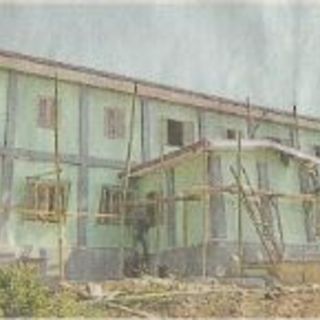A Blessing for the Poorest - "Taunus Zeitung" article from July 12, 2019
A blessing for the poorest
Königstein St.-Lazarus-Fonds supports various projects in Myanmar – many children profit from this effort
The Königstein-based St. Lazarus-Fonds Europe has been active in Myanmar since 2014, in order to make a better life possible for families affected by leprosy. There has been a lot of improvement, but much remains to be done.
By David Schahanian
“I am very happy” said the woman and glowed with both happiness and dignity. Her pleasure is due to a new structure which we take for granted: a toilet with washroom. This makes life much easier for the woman from Myanmar. She is marked by the effects of the “forgotten disease”, and previously had to crawl on her knees to a far-off outhouse. After rainfall the mud made the trip much more difficult.
The name Lazarus means “God helped”. In practice however – at least as representatives – it is the St. Lazarus-Fonds Europe which has been making a more worthwhile life possible in the leper colony Loilem in Myanmar since 2014, with help from donations and the assistance of cooperating foundations. A total of 30 toilets and washing cabins have recently been completed and were entirely financed by the Lieselotte-Faaber-Stiftung in Kronberg. The residents also received hygiene and health lessons in their own dialect.
Learning in Peace
There is also progress in the provision of water supplies for the five villages. Three of them now have their own well. The fourth brought the program to a halt for some time: test drill holes were not successful. Then there was a suggestion from the residents: to lay a pipeline from a far-off spring to the village. In the meantime the fourth village also has a supply of this life-giving elixir. “The water comes from the mountains about 12 to 13km away”, Peter Chung reports. Mr. Chung is the founder and President of the St. Lazarus-Fonds. The additional cost of about 20,000 USD has turned out to be a good investment. On November 18th the new pipeline was officially opened with blessings and a ceremony. The remaining fifth village should receive its own water supply in the near future.
Together with other projects, such as the establishment of cattle and fish farming as well as agriculture, much has been achieved in the past five years. “The quality of life has improved”, Dr. Thomas Gille says. And then he adds: “but there is still a lot to do.” In order to ensure that the projects are sustainable many of them require support and additional financial assistance. The members of the board and other helpers fly regularly to Myanmar, to visit the villages and to keep in touch with progress. On site the project management is carried out by the Caritas organization Karuna Mission Social Solidarity (KMSS).
Help for Orphans
This is also the case with the so-called Boarding House. Starting this year it enables about 50 pupils to learn in peace after school. Additionally, supported by assistants and nuns, the pupils will be encouraged and assisted to pursue higher education. Judging by current photos, a lot is happening already in the ex-convent. The renovation is in full swing, and the exterior already glows in a fresh pastel-green. This is a long term project too. This gives even more value to the Heidelberg Runnebaum-Stiftung, which has committed to a three year co-operation with the St.-Lazarus-Fonds. At the start of the school year in the summer a new program will be launched which will make the participants more aware of the value of a school education, and support about 200 pupils and their families.
Need is not just confined to Loilem. Some time ago a home for HIV infected children in Taunggyi, about 100km away, was brought to the attention of the people from Königstein. The little ones – mostly orphans – were living in a single, run-down room. In the meantime they have been able to move into a new building. Among other things, the St. Lazarus-Fonds financed the furniture and is also involved with the on-going care.
“When we return from there, we are constantly aware of how good we have it here”, says Gille. The team is aware of political developments such as the slow opening of the country or the unresolved situation with the Rohingya, “but we have no influence on them”. They want to continue to concentrate on doing useful work where they can have a positive effect.
